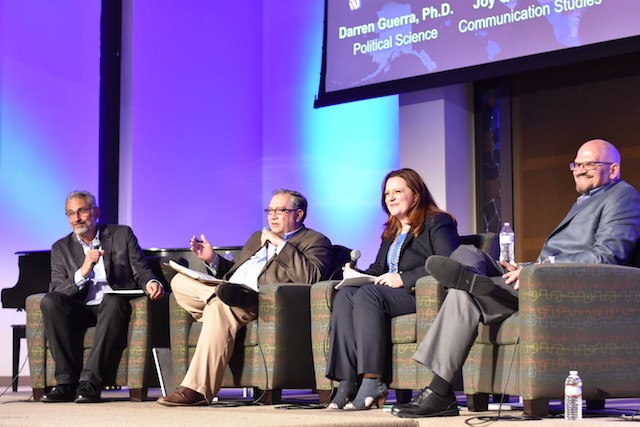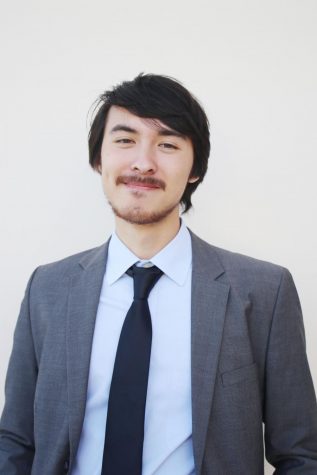Over 20 years ago, two undergraduates at Vanguard University watched as a pair of their professors disagreed over issues in front of a small group of students.
On Monday evening, those undergraduates, now associate professor of political science Darren Guerra and communication studies chair Joy Qualls, had the opportunity to continue the tradition of civil discourse as they discussed how their common faith fuels their diverging political stances.
DUOLOGUE BRIDGES POLITICAL DIVIDE
Professor of communication studies Timothy Muehlhoff and professor of biblical and theological studies Richard Langer, who also moderated the event, announced this first “Duologue” in February. A team of faculty produced the semesterly program alongside administration to help students see an example of healthy disagreement in a contentious political climate.
“You don’t have to get all heated or raise your voice or be frustrated. I think sometimes in college people can get kind of worked up on things, so being able to see it articulated so well and just discuss it was really helpful,” said Rachel Stupfel, senior communication studies major.
Muehlhoff and Langer asked both participants, with Guerra identifying as a conservative and Qualls as a progressive, for their opinions on a variety of issues, including welfare, immigration and the Nashville Statement, allowing them to respond to each other’s comments. After the main discussion, students texted in questions about cultivating respectful dialogue.
“People who hold opposing viewpoints from you—politically, socially, theologically—they’re not your enemy. And even if they were, Jesus gave us a mandate on how we deal with that. And we in the Christian community have a greater obligation to that than we do any association with the systems of this world,” Qualls said during the event.
Before Qualls and Guerra addressed specific topics, they both presented their reasons for holding their respective political ideologies. Both agreed that an understanding of the greatest command Jesus gives—to love God—remains foremost for Christian beliefs. They also addressed the stereotypes commonly held about conservatives and liberals, particularly in relation to the role of government in society.
“I think [for] conservatives, the stereotype is that they’re uncaring or not compassionate because they have reservations about the level of government intervention,” Guerra said during the event. “I think the kernel of truth there is… yes, we want to meet the needs as a community of this person in this dire circumstance, but then, at what cost, and what should that look like?”
Qualls, who explained her family depended on food stamps for a time, countered the stereotype that those on the liberal left have an overreliance on the government.
“There are some for whom that can be true, [but] I think the vast majority of people who find themselves in need of government assistance would tell you that it’s not something that they either desire or something that they want for the rest of their lives,” Qualls said during the event.
As Guerra and Qualls continue the tradition passed down to them by their professors, Langer also encouraged students to make a similar effort by participating in the Better Angels movement, which seeks to depolarize America.
Freshman political science major Seth Gladysz believes Biola has a culture which allows healthy dialogues such as the one during the event to thrive.
“Being able to take a step back and having an open mind to both sides helps you understand, maybe, the side you’re coming from more, and maybe help you centralize a little bit better,” Gladysz said.








